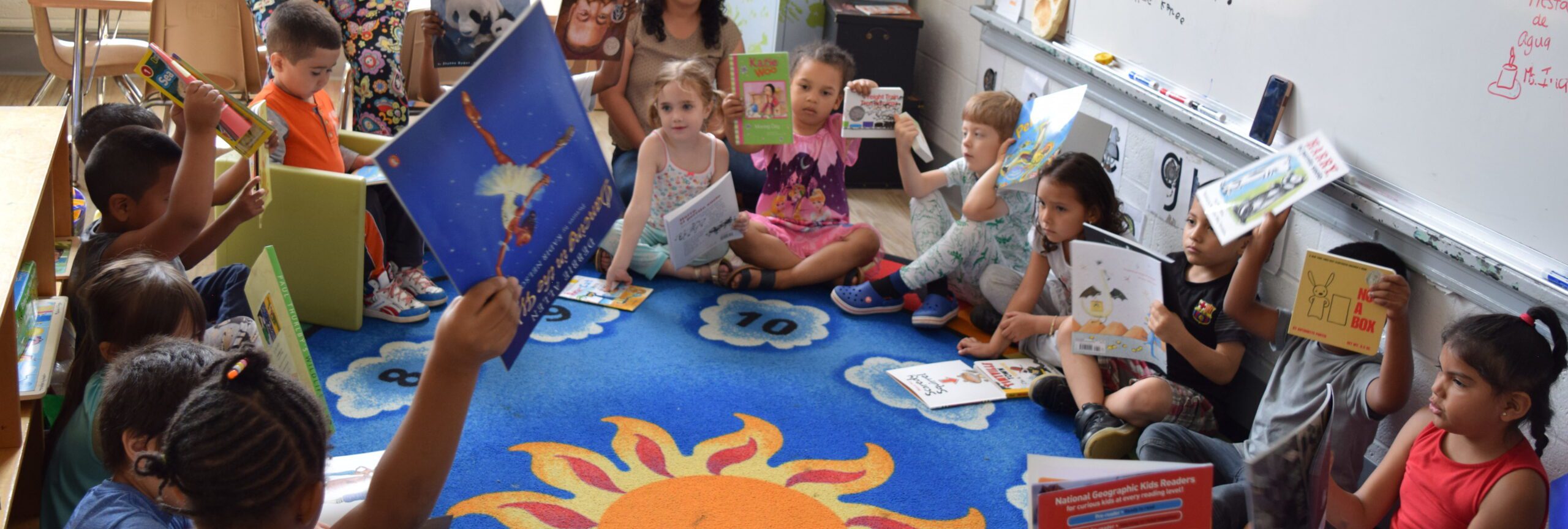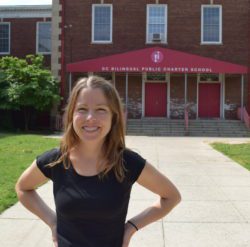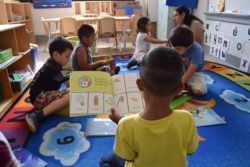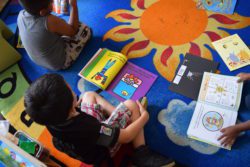
Through Access to Bilingual Books, D.C. Students Develop a Love of Reading

Turning the pages of a book from right to left — or left to right, depending on which language you’re reading — is not an innate skill. It’s something we have to learn.
But most of us don’t remember that lesson in school, because when you grow up with access to books, it’s not a lesson in school at all — it’s something you always know.
But access is not universal.
“We’ve had four-year-olds who’ve come in who don’t orient a book in the right way,” said Amy Dickinson, a preschool teacher at the D.C. Bilingual Public Charter School in Washington, D.C. “They don’t know to flip the pages from right to left. And development is a range. You can tell the kids who have experience and those who don’t.”
A child’s future academic success is already at stake at age four. Access to adequate resources is one of the greatest contributors to educational attainment in the United States, but research has identified vast ‘book deserts’ concentrated in low-income communities across the U.S. — with one community having only a single book to be shared among as many as 830 children.1
And the type of book matters. Researchers have found that children’s literature reflecting multiethnic cultures told by authentic voices can enhance empathy toward others as well as interest in reading and academic performance.2
Given that almost half of Dickinson’s and her colleagues’ students’ first language is Spanish, access to quality books in Spanish was a priority. She recounted one teacher in her school who would borrow books from the public library to be able to provide her students more books in Spanish.
“Oftentimes, she has to settle — not necessarily for the book she most wants to use but for the book that is available,” Dickinson explained. “And this is often not the book she thinks would be the best for the lesson or the one that is most engaging.”
However, with First Book, Dickinson and her fellow teachers have been able to give more than 500 books to their students, which include books in Spanish and bilingual books. Access to quality books in different languages has helped students improve their literacy rates and increased family engagement.
“When kids have families that are talking to them and reading with them at home, that’s when kids really excel,” Dickinson said. “Especially when you’re able to have the books in Spanish for our families who speak Spanish at home. I think that really makes a difference.”
And it has. Through having access to quality books that they like, her children have become more interested in reading and even like to write their own stories.
“These kids get so excited,” Dickinson says, “when they make their book and then they want to sit in the reader’s chair and read it to the class. Just that — that this class thinks reading and writing is so awesome. That’s fun for me.”
“We couldn’t afford to send books home with every child,” Dickinson adds. “And now [after using the First Book Marketplace], we send books home with every child.”
 Not only was she able to send home books — but through First Book, she could send home new, quality books. “There’s something really special and exciting about having access to books that are really cared for or that they can take home,” she said. “So, there is a difference, too, in the ability to get new books from First Book versus donated books.”
Not only was she able to send home books — but through First Book, she could send home new, quality books. “There’s something really special and exciting about having access to books that are really cared for or that they can take home,” she said. “So, there is a difference, too, in the ability to get new books from First Book versus donated books.”
But one of her fears is that she will one day no longer be able to access such new, quality, and diverse books — and all of the progress she has made with her kids would fall to the wayside.
“The idea that there wouldn’t be a table full of books,” Dickinson states, “just feels desolate and bleak to me.”
If you would like to help teachers like Amy Dickinson have access to new, quality books for their children, you can donate to First Book. Through September 6, every $3 will provide 2 books for kids and teachers, thanks to a donation match from a generous group of donors.
- Susan B. Neuman, Naomi Moland. “Book Deserts.” Urban Education, 2016. DOI: 10.1177/0042085916654525
- Children’s Books By and About People of Color and First/Native Nations Received by the CCBC*–US Publishers Only 2015 –
